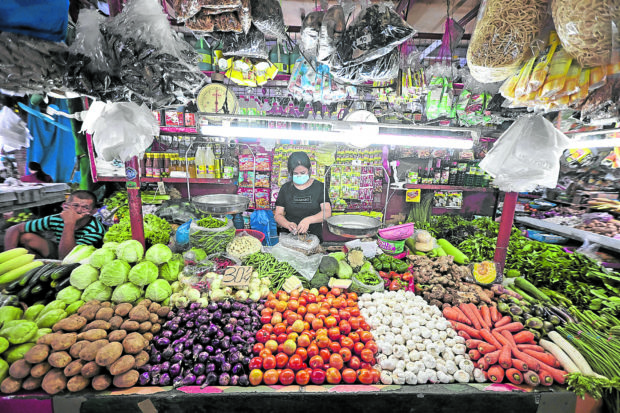
A vendor tends to fresh vegetable produce at a stall in Mega Q Mart in Cubao, Quezon City on Thursday, March 2, 2023. (File photo by GRIG C. MONTEGRANDE / Philippine Daily Inquirer)
MANILA, Philippines — The Department of Finance on Tuesday recommended to President Ferdinand Marcos Jr. a host of measures to address inflation, which remained elevated at 8.6 percent in February due to high food prices brought about by agricultural supply shortages.
The president presided over a sectoral briefing with Finance Secretary Benjamin Diokno and other government officials wherein he was given a comprehensive report about the sources of inflation, citing in particular the supply shortfalls in food items such as vegetables, meat, sugar, and fish, as well as the courses of action needed to address high prices.
In a brief statement, Presidential Communications Secretary Cheloy Velicaria-Garafil said Mr. Marcos approved the proposals “in general.”
Diokno said that among the measures was the establishment of an interagency committee to monitor prices, agricultural production, and food supply to help the government decide when is the right time to import.
Secretary Arsenio Balisacan of the National Economic and Development Authority (Neda) noted that the creation of the high-level committee was urgent.
“We must rethink our strategies to combat rising food prices (since) the country’s current high inflation is largely driven by domestic, supply-side constraints,” Balisacan said. “The solution is to get to the root of the problem, including fixing the bottlenecks along all segments of the agricultural value chain.”
According to Diokno, the proposed Inter-Agency Committee on Inflation and Market Outlook would serve as an “early warning system” on supply situations.
“This will be a permanent committee. And its job is to come up with the demand-and-supply situation, and we will report to the President on a monthly basis on what is the situation. If we need to import, we will import,” Diokno said.
“So the decision to import won’t be ad hoc anymore if there is a need to import,” he added, recounting instances that after a decision is made to import agricultural products, these would arrive when the local harvest season has already started, resulting in complaints from farmers.
The committee, according to Diokno, could make “science-based” forecasts on agricultural production by using satellite mapping.
“You can see if [the farmers are] still planting, you’ll know how many hectares have been planted on, and you’ll see the development. If there’s a typhoon, you’ll see [the effect] through the satellite. So we will use that kind of model to forecast,” Diokno said.
Easing Customs rules
He added that the fast-tracking of government processing of clearances for agricultural goods, which would entail digitalizing the procedures of the Bureau of Customs (BOC), was also suggested to the president.
The removal of the required authority to release imported goods (Atrig) was likewise raised in order to speed up the release of food imports from the BOC.
Diokno also pushed for the removal of the certificate of necessity to import (CNI) for fish, as well as the digitalization, centralization, and simplification of sanitary and phytosanitary import clearances and regulations.
“[When an imported product] was okayed in a foreign country and the approval is reliable, let us not repeat it again [here] to hasten its release,” the secretary noted.
On Tuesday, the Philippine Statistics Authority reported that inflation, which measures the average increase in the prices of essential goods and services, eased slightly last month from 8.7 percent last January.
However, it is forecast to remain high throughout the year based on a forecast of the Department of Agriculture pointing to an inadequate supply of staple food items such as rice, corn, raw and refined sugar, pork, and fish, according to Diokno.
In a press briefing, National Statistician Dennis Mapa said the slightly slower inflation in February was due solely to lower price increases in the transport commodity group — particularly gasoline and diesel prices.
Of the 13 commodity groups included in the computation of inflation, nine showed continually faster year-on-year price increases compared to January, among them food and nonalcoholic beverages; alcoholic beverages and tobacco; clothing and footwear; health, and information and communication.
Mapa said the biggest contributor to rising prices in February were food items, particularly vegetables, fish, and meat.
According to Diokno, the government would intensify the implementation of programs to help boost production and enhance agricultural productivity to help bring down prices.
Diokno noted that the national budget for 2023 has set aside P26.6 billion in subsidies to help the most vulnerable sectors such as drivers of public utility vehicles, farmers and fishers cope with rising prices.
These include P13.3 billion for the fertilizer discount voucher program, P1 billion for fuel discount to farmers and fisherfolk, P3 billion for fuel subsidies to the transport sector affected by higher fuel prices, and P9.3 billion for the extension of the targeted cash transfer program.